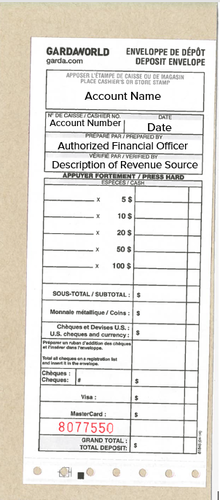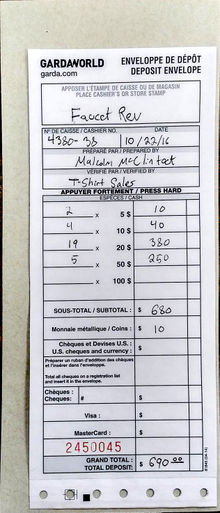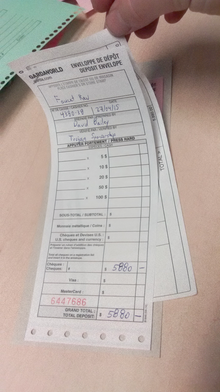Difference between revisions of "Receiving Revenues"
Malcolmmcc (talk | contribs) (→Security) |
Malcolmmcc (talk | contribs) |
||
| Line 26: | Line 26: | ||
==Credit== | ==Credit== | ||
With the new card reader at the General Store, your group can know accept credit and debit card payments when you are tabling for your event. Email generalstore@mcgilleus.ca beforehand if you want to accept credit and debit card payments. However, we do not accept online payments. So do not ask for the EUS bank account information. <br> | With the new card reader at the General Store, your group can know accept credit and debit card payments when you are tabling for your event. Email generalstore@mcgilleus.ca beforehand if you want to accept credit and debit card payments. However, we do not accept online payments. So do not ask for the EUS bank account information. <br> | ||
| − | <center style="font-size:18px">''[[FOAPAL | + | <center style="font-size:18px">''[[FOAPAL|Click here for more info on FOAPAL's]]</center> |
| + | ==Cheques== | ||
| + | There may be situations where a cheque will be written to your group, but the cheque will be mailed to the EUS. This is often the case for McGill funding sources, like [[MESC]] funding or funding from departments. This is perfectly fine. However, it is very important that you inform the EUS VP Finance or Dianne that a cheque is coming, and for how much. Cheques sometimes come with no description, and it may be difficult for us to ensure that the cheque goes to your group if we have no way of knowing who the cheque is intended for. | ||
Revision as of 21:47, 27 December 2016
The main sources of revenues come from student fees, event tickets, or sponsorship. Many revenues will be deposited in your account without you ever seeing them, such as student fees (for departments), MESC funding, and any other revenue that is mailed directly to the EUS. We will try to inform you when something has been received, but you should make sure you check your accounts every now and then to find out about these, or ask the VP Finance about specific payments. In addition to these deposits that come in automatically, there are many that you will need to deposit yourself. These consist of cash or cheques that you collect personally for events, fundraisers, and other initiatives that you coordinate.
Deposit slips
In the EUS Office, there are deposit slips located in the rack on the right as you enter (see photo to the right). A few of the fields on the deposit slip are a little unclear. You should make sure that you include your name, the name and number of the account you are depositing to, the date, and a few words to describe what the deposit is for. The description is important, because our bookkeeper will use it to determine whether taxes should be remitted, which affects your revenue flow. The image below shows a properly filled out deposit slip.
Acceptable deposits include cash, coins, and cheques. When depositing a cheque, you must attach the cheque stub to the top white copy. If there is no stub, then you must make a copy of the cheque and attach it. Please ensure that coins are submitted by the roll when there are sufficient coins to make a roll. There are spare rolls in the EUS Office – ask Dianne during business hours. Deposits should be made only in Canadian currency. With the exception of US coins, do not accept foreign currency, unless you want to try to sell it.
Submitting the Deposit
When you have filled out the deposit slip, detach the pink slip (it’s a carbon copy). This is your receipt, which you should keep in your records. DO NOT detach the white slip on top. When depositing a cheque, you must attach the cheque stub to the top white copy. If there is no stub, then you must make a copy of the cheque and attach it.
| “ | You must attach a cheque copy/stub on the back of the white deposit slip | ” |
Next, seal the deposit envelope, and put it in the drop safe. The drop safe is located in the closet as you enter the EUS Office on the right. Place the envelope in the safe, turn the wheel, and make sure that it dropped through. Your deposit will be processed within two weeks of you submitting it, and it should be in your accounts between two and four weeks after being processed. The location of the safe can be seen to the left.
Security
When collecting money for an event, you should make frequent deposits, rather than holding onto large amounts of cash at a time. For example, if you expect $5000 in ticket sales to an event, you might make deposits every $1000 or so, or even every few hundred. It’s not always safe to be sitting around with thousands of dollars in cash in front of you when you are tabling.
Cash that you hold onto is not secure or insured, but by depositing it you can be more assured of its safety. As warm and fuzzy the EUS community seems to be, you’re in the middle of a big city, and the EUS HAS been robbed in the past (nothing violent – someone broke into the VP Finance Office and made off with some cash a few years ago). If you keep money in a departmental lounge or a locker or something for temporary storage, you are putting your group and the EUS at risk.
And as a side note, if you decide not to make a deposit at the end of the day but are unsure where to store the money you have, you can keep your cash box stored in the EUS VP Finance Office where it will be relatively safe.
Credit
With the new card reader at the General Store, your group can know accept credit and debit card payments when you are tabling for your event. Email generalstore@mcgilleus.ca beforehand if you want to accept credit and debit card payments. However, we do not accept online payments. So do not ask for the EUS bank account information.
Cheques
There may be situations where a cheque will be written to your group, but the cheque will be mailed to the EUS. This is often the case for McGill funding sources, like MESC funding or funding from departments. This is perfectly fine. However, it is very important that you inform the EUS VP Finance or Dianne that a cheque is coming, and for how much. Cheques sometimes come with no description, and it may be difficult for us to ensure that the cheque goes to your group if we have no way of knowing who the cheque is intended for.




